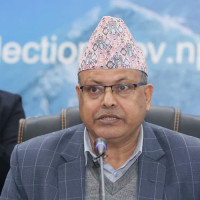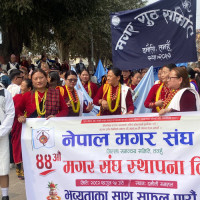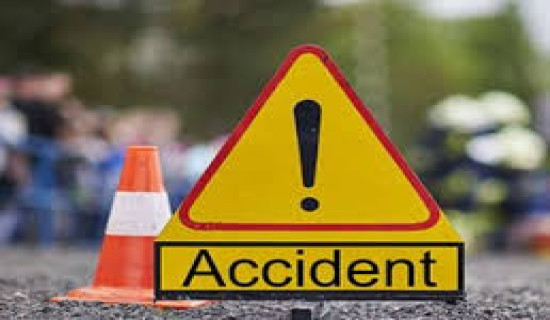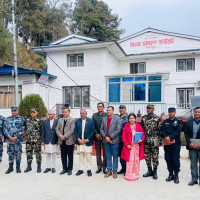- Saturday, 28 February 2026
Poll Preparations In Progress
More than two months have passed since the historic Gen Z movement took place in Nepal, removing the KP Sharma Oli-led government and making a Clarion call for change. The uprising that dealt a severe blow to the erstwhile two ruling parties—CPN-UML and Nepali Congress (NC)—has sought drastic reforms in governance. That situation emerged because people were unable to experience any perceptible improvement in service delivery despite a remarkable change in the political system and the implementation of the new federal constitution. The young protesters also pointed to rampant corruption in public institutions and a lack of accountability and transparency. The government’s misstep to put a ban on several social media platforms was also responsible for the youngsters taking to the streets.
Voter list registration
Although political instability continues to linger in the country, the interim government, as per the mandate given to it, has expedited preparations for the by-elections to the House of Representatives (HoR) on March 5, 2026. A voter list registration process is still going on. The Election Commission (EC) has lately extended the deadline to update the voter’s list until November 21, considering a growing level of enthusiasm among potential voters to get their names registered. As of now, hundreds of thousands of new voters have got their names incorporated on the list. In a bid to ease the voter registration process, the government has also allowed people having their National ID Cards to register online. This facility has inspired many potential voters to file registration forms without having to stand in long queues.
The government and the election body seem to have been working actively towards making the important national event a great success. Prime Minister Sushila Karki has reiterated that the government would leave no stone unturned when it comes to conducting the elections in a free, fair, and fearless manner. Ever since she assumed her office, the former Chief Justice has said that she has no interest in lengthening her six-month tenure. In addition, the government has managed a budget for elections even amidst the challenging economic situation. Recently, the Ministry of Finance has endorsed a budget of Rs. 4.96 billion for the HoR polls. However, the EC had sought a total budget of Rs. 7.5 billion. The ministry has assured that it would release additional amounts for elections when they were required. Meanwhile, the EC has asked political parties willing to take part in the impending HoR and National Assembly (NA) polls to register.
Issuing a notice, the poll body has called on political parties to register from November 17 to 26 for participation in the HoR elections and from November 17 to 23 for taking part in the NA elections. The issuance of electoral schedule and carrying out other groundwork seem to have helped create an election atmosphere in the country. Similarly, after holding consultations with the EC, the government is working on an ordinance to make necessary arrangements for eligible Nepali citizens living abroad to cast their ballot in the coming polls.
Ensuring voting rights to such people has been a longstanding issue. The government and the EC have no much time to make this sort of arrangement. An estimated 3.5 million Nepalis are believed to have been staying and working in numerous countries across the world. They send a lot of remittance back home but they have been deprived of their constitutional right to vote. Through this ordinance, the government aims at ensuring voting rights to them and others who are out of their respective constituencies. Even if it may not be possible for the EC to participate all the targeted voters in the electoral process for now, this provision should be enforced in certain countries as a pilot programme for now.
Congenial environment
As key stakeholders, political parties have a crucial role to play in the creation of a congenial election environment in the country. But, they are not found fully prepared for the upcoming elections. Despite being the largest party in the dissolved HoR, NC appears to have been mired in internal wrangling. Many young leaders, including general secretary duo Gagan Kumar Thapa and Bishwo Prakash Sharma, have been in favour of holding the party’s general convention or special convention before the March 5 elections. Their view is that the change in the party leadership is a must prior to elections to give a new lease of life to the country’s oldest democratic force.
The party might suffer a huge setback in the coming elections if it goes to the polls without altering its captain. They had also been lobbying for transfer of leadership to young generation for the past several years. But, their voices remained unheard as the party president Sher Bahadur Deuba and his aides prioritised acquiring only power and sidelining the opponents. The party’s establishment faction wants to avoid both general convention and special convention before elections by any means.
Even amidst ongoing poll preparations, CPN-UML has chosen street protests, demanding the reinstatement of the dissolved parliament. The party has also sought action against those involved in vandalism and arson incidents during the Gen Z movement. The party’s chair Oli wants to be elected to the leadership for the consecutive third term from the 11th general convention slated for December 13-15 in Pokhara. As elections are the lifeblood of a democracy, political parties and all other stakeholders must prepare for the coming polls. Likewise, the interim government must give special attention to poll security. In addition, a voter education campaign needs to be conducted nationwide so as to generate awareness about the electoral processes and the importance of exercising voting rights.
(The author is a former deputy executive editor of this daily.)









-original-thumb.jpg)







